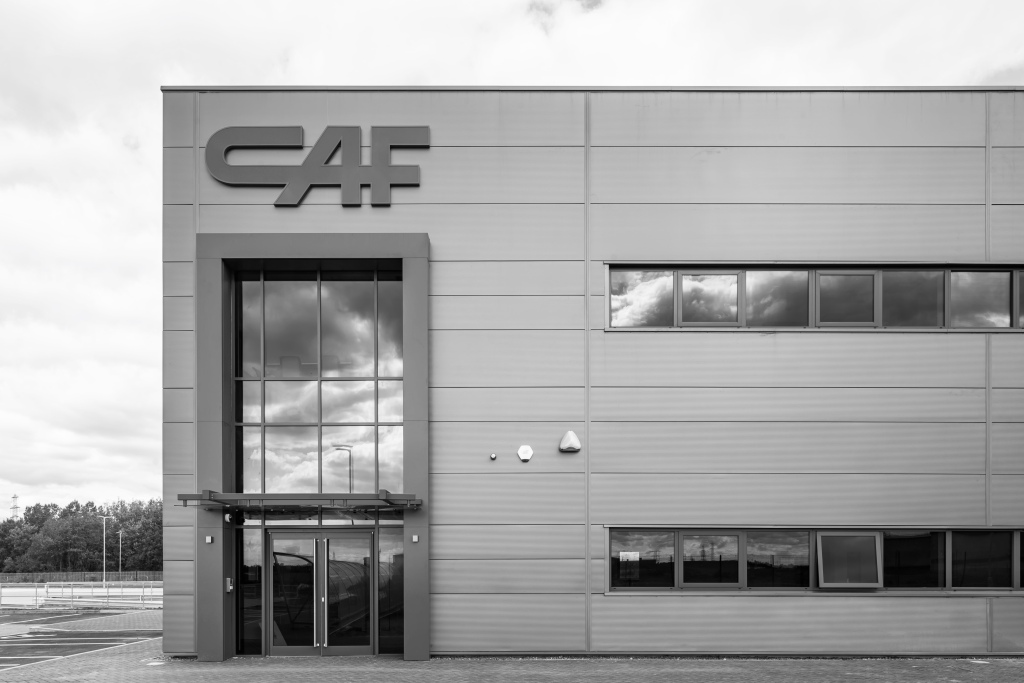After writing about Bombardier Transportation’s train-building plant in Litchurch Lane, Derby, it is at last the turn of the new Construcciones y Auxiliar de Ferrocarriles, S.A. (CAF) assembly plant in Newport, South Wales, which was officially opened by The Prince of Wales on 21 February, 2020.
Having announced plans to establish a UK presence back in 2016, CAF considered more than 100 potential sites across the country for their new assembly and finishing plant, before announcing in July, 2017 that Newport, South Wales had been chosen as the preferred location.

Among other considerations, the Welsh site won out given that it provides the Spanish train manufacturer with a connection to the existing UK rail network and access to a skilled local labour market.
The Newport plant represents an initial investment by CAF of almost €40m. Whilst this might sound like an impressive number, it includes a “multi-million pound funding package” from the Welsh Government’s Inward Investment Programme and should be placed in the context of CAF having recently won contracts from UK Train Operating Companies (TOCs) worth an aggregate €2.5bn.
Underscoring the importance of the UK rail market, in 2019 the country accounted for 14% of CAF’s total revenue, down from an even higher 23% in 2018.
In a further political win for both sides, the current UK backlog also includes a reported £400m order for 77 new trains from KeolisAmey, who operate the Wales and Borders franchise in partnership with Transport for Wales. Announced in June, 2018, the entire fleet will, unsurprisingly, be ‘Made in Wales’ by CAF.
Located on the Celtic Business Park, which forms part of St. Modwen’s £1bn regeneration of the former Newport Llanwern Steelworks, the CAF site occupies 46,000 m2 and includes a 15,000 m2 production facility, all of which could be expanded in the future, if required.

Designed by Roberts Limbrick Architects, construction of the new building was completed by Bowmer & Kirkland in July, 2018, at a cost of £22m, with the first CAF employees starting work in September.
The main building is 175m in length and houses five testing bays (roads A-E), a final assembly area with three production lines (roads F-H), and a warehouse for incoming parts.
Given that Newport is equipped only for assembly and testing, with a single 30m long specialist paint booth, pre-painted body shells are shipped to the UK from CAF’s main Beasain plant in Spain, which has the capability to manufacture all types of rolling stock, including the production of axles and wheels. For context, the Beasian buildings are more than 10 times the size of Newport, at 180,800 m2.
Newport’s first task was the completion of the Northern Trains contract, which saw assembly of British Rail (BR) Class 195 Civity Diesel Multiple Units (DMUs) carried out at the Welsh plant.
Production has now turned to another Civity DMU order of 26 units for West Midlands Trains (WMT), which will consist of 12 x two-car and 14 x four-car trains. Designated as BR Class 196, the majority of these trains will be assembled in Wales.
Finally, the plant will focus on the 77 BR Class 197 trains for Wales and Borders, which are expected into service in 2022 and will be formed of 51 x two-car and 26 three-car units, all Civity DMUs.

The expectation is that Newport will ultimately employ around 300 people when it reaches full capacity, however once the Transport for Wales order has been completed, the production outlook becomes less clear.
It remains uncertain as to where a new fleet of 43 x five-car trains for London’s Docklands Light Railway (DLR) will be built, however Newport could be chosen for that work. CAF is also bidding for the HS2 contract, which will consist of at least 54 train sets, and where a successful bid would require the current site to be expanded.
Ultimately, the creation of 300 skilled and well paid jobs is a positive for both the Welsh and UK economies, yet with bodyshells, engines and wheelsets all manufactured elsewhere, along with the majority of other key components, it is debatable as to how much economic value is created at the Newport plant. CAF has stated its intention to develop the supply chain in South Wales, yet this remains a work in progress.
The risk is that after the initial backlog of orders has been completed, new work dries up and jobs are lost, as has proved the case with Hitachi at Newton Aycliffe.
A sustainable future therefore relies on CAF continuing to win new orders in the UK, however that is against an increasingly competitive backdrop, where Bombardier, Hitachi and now Siemens can all claim to support British jobs through domestic production.
July, 2020.